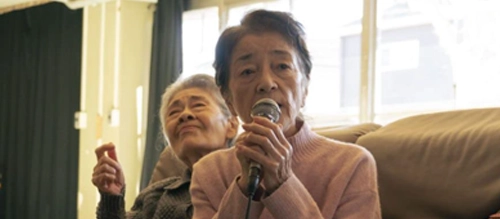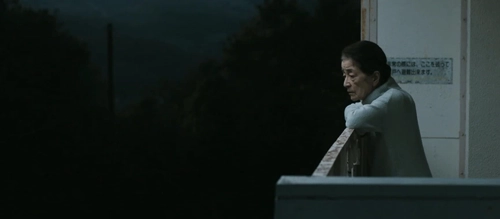Plan 75 (2022) Review

Plan 75 (2022)
Director: Chie Hayakawa
Screenwriters: Jason Gray, Chie Hayakawa
Starring: Chieko Baisho, Hayato Isomura, Stefanie Arianne, Yumi Kawai, Taka Takao, Hisako Okata, Kazuyoshi Kashida
What do you do when a population becomes too old to sustain itself?
The idealist would argue that you find a way to look after everyone, no matter how difficult it is. Of course, good intentions aren’t always as substantive as we’d hope, and there are multiple factors which contribute to whether or not that is even possible. In Plan 75, the Japanese government has chosen to introduce a programme whereby elderly members of the population can voluntarily terminate their own lives to ease their personal burden on society. This is the titular PLAN 75. The reward for such a selfless act is just enough money to cover a funeral if the participant wishes to use it for that reason.
An expositional cold start focuses on a radio news report to explain the situation. It’s heightened, for sure, but it’s eerily similar to the political landscape of the world today. The culture wars that are raging against anyone with a difference to the median of a given population is in this case fuelled by the ideology that a person has ceased being useful to society at the age of 75 and should therefore be euthanised for the greater good.
The bleakest aspect of Plan 75 might be the imbalanced power dynamic that PLAN 75 creates. It relies on the elderly having such respect for the society that they come from that they’re literally willing to die for it once they’ve stopped contributing to it. You can assume the participants in the programme are usually from a lower socioeconomic background because of that – they wouldn’t be in a position where they’d be seen to cease their useful lives if they were not. The problem is that PLAN 75 shows them none of the respect or servitude that they show their society. In offering a nominal payment for taking part in the programme which may or may not be used for the participant’s funeral, it basically leans on the goodwill of that person to accept a dismal send-off for the sake of the state not having to deal with the problem of what to do with them once they’ve died.
The story of Plan 75 is far more personal than just the evil of national politics though, and we see it through three central characters. Michi (Chieko Baisho) is an elderly woman who finds herself being squeezed towards the outskirts of society as she gets older. Her husband isn’t around anymore, she’s about to retire, and she’s struggling to find new accommodation with landlords unwilling to rent properties to anyone her age. Or rather, with such little time left. Himoru (Hayato Isomura) is a government employee, a sort of salesman for the PLAN 75 programme. He is young and naive to the intricacies of what his job entails because he’s part of a power structure that should be allowed his trust. It’s only when his uncle shows an interest in the programme that he begins to question it. Maria (Stefanie Arianne) is an immigrant care worker who simply can’t afford to turn down the chance to earn more money by becoming a PLAN 75 employee.
It is all, essentially, a lesson in empathy. None of them are extraordinarily good or bad people. The circumstances that they find themselves in are extraordinary to us, but they’re presented with such melancholy that Plan 75 achieves a documentary-like quality. Of course, it helps that every actor is giving a performance capable of such realism, but credit should also go towards the cinematography and set design. Every shot is composed in a way that feels every bit as intimate as the narrative, all while the bright blue and orange PLAN 75 branding pops out of a usually muted colour palette in a way that almost creates a jumpscare out of government bureaucracy.

The most heartbreaking story of the three main characters is that of Michi. That isn’t to undermine the other two – they each have to go through morally agonising personal journeys – but with Michi, we’re with her as she’s waiting to die. The sadness that she experiences as a result of living in a world that is trying to move forward without her is what leads her to take part in PLAN 75, and it continues until all she has left is a government officer helping her to prepare for her final day by telephone. There’s really only one glimmer of joy in her life, and it’s a takeaway restaurant showing her enough kindness to break their usual policy of not delivering to a single-person household.
Between the three characters, Plan 75 encourages us to think about how right or wrong any of this can be. Whether living for the sake of staying alive is worth anything, but also how we might act if we were to find ourselves in a country enacting similar programmes. The perspectives that it doesn’t show are those of the government and the general public who are in support of euthanising the elderly. It isn’t that they feel essential to the overall narrative – this is very much the story of three people rather than the story of the country – but some additional context might have served to provide a more rounded commentary on a future we could easily be heading towards.
Much like Alfonso Cuarón’s Children of Men (2006), Plan 75 provides us with a snapshot into a near-future where the human need to grow, expand and innovate has caused a problem of overwhelming hopelessness. The existential crisis that it invites is certainly bleak, but it is just as fascinating as it is tragic.
Score: 17/24
Written by Rob Jones
You can support Rob Jones on his website: rbrtjones.com
Twitter: @rbrtjones

